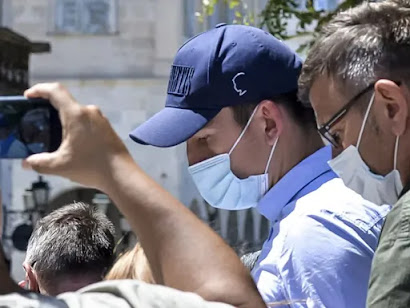Harry Maguire's Biggest Defensive Role: The Law of the Land
The present post will inevitably divert considerably from its sports law nature and will focus on an analysis of a foreign legal system (Hellas), with reference, mainly, to procedural matters. Where relevant, the author would touch upon the disciplinary law elements that could allow the reader to formulate a more comprehensive view about the relevant issues, within the wider discipline of sports law. As a disclaimer, the author would like to confirm that he does not currently have a professional relationship with any of the parties in this criminal matter, between the Hellenic Republic and Harry Maguire.
There has been a lot of confusion regarding procedure and practice in this criminal matter and, inevitably, people are left wondering what the true state of affairs is. As a first point in this analysis, it is necessary for the author to confirm that the basis of Hellenic law derives from Roman Law and the modern procedure in the country resembles the Franco-Germanic system. It is, therefore, a civil law based system, with emphasis on an inquisitorial approach (as opposed to UK's adversarial system), where the judges have enormous authority in examining the facts and the evidence, as well as the appearing witnesses.
In the matter of Harry Maguire, we have the application of a flagrante delicto offence, meaning that the accused is 'caught in the act' or 'during the commission of an unlawful act.' Procedure dictates that the accused must remain in custody until they are charged and this must take place within 24 hours. These types of offences are included in Article 99 of the Hellenic Penal Code and Law 4619/2019 and are treated as misdemeanours. If the court feels (upon conviction) that the accused deserves a sentence of less than 3 years (provided that there is evidence to the effect that the accused will not re-offend), then such sentencing is suspended. Prior to the trial and if the accused is charged, as it was the case with Harry Maguire, the brief with the charges must reach the office of the Public Prosecutor, who then has to decide, (based on the evidence submitted in the brief), whether the accused will stand trial. It is normal procedure to afford the accused a three-day period, where they can prepare their defence. Although this may appear strange in the eyes of an English lawyer, the underlying premise for such swift process is that 'justice delayed is justice denied.'
The Public Prosecutor cannot normally recommend a trial unless the brief is complete. This means that the Public Prosecutor decided to commit this matter to trial, because he felt the brief was complete (and included the testimonies of the police officers - such testimonies must have reached the hands of the Defence on Saturday, that is 3 days prior to trial - if not, then there is a possibility a procedural breach has taken place). This was perhaps the reason the court felt that any requests for an adjournment had no valid basis; and that is because the court must have felt the Defence was afforded the brief in the time prescribed by law. Whatever the basis for such dismissal, if the Court of Appeal feels that there has been a procedural breach (caused by the First Instance court), then this will be remedied on appeal.
Notwithstanding the Defence's complaints for lack of time towards an appropriate preparation, the procedural aspects need to be separated from the substantive ones. The former, if they were breached, may offer Harry Maguire remedies on appeal; the latter form the basis of exactly what it would determine whether his conviction would stand or not. The probity of the submitted evidence, therefore, as well as the credibility of the witnesses, would determine whether the burden of proof has been met by the prosecution.
The above raises certain questions that would determine the final outcome of the matter. The author, out of respect for Harry Maguire's preparation towards his appeal, would refrain from an analysis regarding the substantive issues. Procedure, however, needs to be explained, as it has been the focus of misinterpretation and misleading public statements. Hellenic procedure on appeals from misdemeanour offences (such as the ones Harry Maguire was convicted of), dictates a de novo hearing, where we have a full re-trial with the judges having the authority to examine, both, the facts and the law. This is very similar to the process and procedure before the Court of Arbitration for Sport (CAS) in Lausanne, where an appeal takes the form of a full and new hearing (start from the beginning).
The author, however, would like to recommend caution to the consequences of this process. It has been stated on record that 'the filing of an appeal extinguishes the initial court verdict and nullifies the conviction.' https://news.sky.com/story/harry-maguire-manchester-united-captain-says-he-thought-he-was-being-kidnapped-during-arrest-in-greece-12058114 This cannot be further from the truth and it is, with respect, erroneous and misleading. An appeal process can never extinguish a court verdict and can never nullify a conviction, at least, not before such appeal process has come to a conclusion with a final outcome. This means that Harry Maguire's conviction remains in force, pending the outcome of the appeal. The same goes for the suspended sentence, which has a duration of three years. This means that Harry Maguire has no restrictions in terms of his liberty, but should he visit Greece again, he must be very careful not to re-offend. In addition, Harry Maguire does not have a criminal record at the moment, pending, again, the final outcome of his appeal.
Finally, it is important to consider some consequences that are very relevant to the wider discipline of sports law. Although criminal law is kept separate from disciplinary law, sometimes the latter attempts to regulate the kind of the anathema usually the former regulates. The first consequence of the application of disciplinary law was felt by the Manchester United captain on 25 August 2020, when Gareth Southgate announced that he had withdrawn Maguire's selection to play for the national team https://www.bbc.com/sport/football/53892235 This is a form of a disciplinary action, regardless of whether the England manager can justify it or otherwise.
Similarly, in terms of disciplinary law, the reader would identify certain provisions, in the Standard Form Premier League contracts, where criminal convictions are considered offences of 'gross misconduct' leading to dismissal. The author is not suggesting that Manchester United will dismiss their captain and this is a rather remote scenario. The student of sports law, however, would recall the case of the former Chelsea player Adrian Mutu (Chelsea FC v Mutu CAS 2006/A/1192, when his anti-doping conviction (by a forum with a lesser authority) led to his dismissal from his club, with a subsequent action for damages. In addition, there may be consequences with sponsors, image rights holders, etc, who may have something to say in the event the Hellenic Court of Appeal decides to dismiss Maguire's appeal. These are all elements of disciplinary law, within the wider sphere of sports law.
In conclusion, one would be hard pressed to accept that this is a situation that the Manchester United captain desired. A deserved holiday was turned into a summer nightmare, on a cosmopolitan and idyllic island in the Aegean Sea. The truth of the matter remains that this saga will continue to lurk around in the media. Whether it is political correctness considerations, or ethical considerations or otherwise, that would inflate the current position, those advising Harry Maguire, owe him a duty to shield him properly and in an appropriate manner. This is relevant to the club too and caution must be applied, particularly where public statements are concerned. Accuracy in such statements is important, especially where Harry Maguire and the status of his appeal are concerned.
The author cannot deny his affinity for Manchester United and as a fan he would like to wish a happy and satisfactory resolution for the Manchester United captain. Equally speaking, the author cannot divert from his primary duty and belief towards the truth. In this light, the author is convinced that Harry Maguire will receive a fair trial in the land that gave birth to justice and fairness. In this light, Socrates believed that absolute truth is paramount and the best communication between people is when the truth is applied properly. His great student Plato took one step further and he wrote that the process of questioning and testing is the best way of arriving at the truth (the dialectic method). These two together agreed, rather ironically, that wisdom arrives not when someone has knowledge of the truth, but, rather, when someone is ignorant of it. For the sake of Harry Maguire and the truth itself, let us be ignorant of it (the truth) and let a higher authority rule upon it.
Rhetoric aside, the author is certain that truth will prevail and the Hellenic Court of Appeal will rule on the facts and the law, without prejudice, and with an unparalleled dedication towards fairness and equal treatment.
Dr Gregory Ioannidis*
28 August 2020
*Gregory Ioannidis is a sports lawyer and an anti-doping litigation expert. He has represented over 100 athletes on allegations of anti-doping rule violations. He is a former The FA registered lawyer and has acted for and represented many players and clubs around Europe, Africa and Asia. He is currently the Course Leader of the Master's Programme LLM International Sports Law in Practice at Sheffield Hallam University and an academic associate at Kings Chambers in Manchester.




Comments
Post a Comment